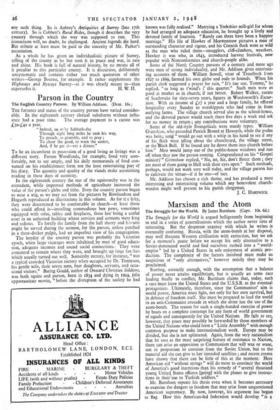Parson in the Country
The. English Country Parson. By William Addison. (Dent. 16s.) THE fortunes and status of the country parson have varied consider- ably. In the eighteenth century clerical subalterns without influ- ence had a poor time. The average payment to a curate was £3o-£4o a year.
" Indeed, on ev'ry Sabbath-day
Through eight long miles he took his way, To preach, to grumble, and to pray ; To cheer the good, to warn the sinner, And, if he got it—eat a dinner."
To be an incumbent in possession of a good living or livings was a different story. Parson Woodforde, for example, lived very com- fortably, not to say amply, and his daily memoranda of food con- sumed on his establishment form not the least entertaining part 'of his diary. The quantity and quality of the viands make astonishing reading in these days of austerity.
In the eighteeenth century the star of the squirearchy was in the ascendant, while improved methods of agriculture increased the value of the parson's glebe and tithe. Even the country parson began to wear a wig, as we may see from the pictures by Rowlandson and Hogarth reproduced as illustrations in this volume. As for tie they were determined to be comfortable in church—at least those who could afford it—installing commodious box pews, sometimes equipped with sofas, tables and fireplaces, these last being a useful asset in an unheated building where services and sermons were long and tedious. To fortify the family from the hall sherry and b:icuits might be served during the sermon, for the parson, unless perched in a three-decker pulpit, had an imperfect view of his congregation. The heyday of the country parson was probably the 'i ictorian epoch, when large vicarages were inhabited, by men of good educa- tion, adequate incomes and sound social connections. r They were contented to remain where they were, and brought up large fan.ilies which usually turned out well. Somersby rectory, for instance, "was a typical crowded Victorian rectory when occupied by Dr. Tennyson, his gentle wife, their seven sons, four daughters, servants, and occa- sional visitors." Baring Gould, author of Onward Christian Soldiers, was both squire and parson, born in 1834 and dying in 1924, felix opportunitate mortis, " before the disruption of the society he had known was fully realised." Marrying a Yorkshire mill-girl for whom he had arranged an adequate education, he brought up a lively and devoted family of fourteen. " Rarely can there have been a happier marriage." His life of Hawker of Morwenstow pictures a man of outstanding character and vigour, and his Cornish flock were as wild as the man who ruled them—smugglers, cliff-climbers, wreckers. Hawker it was who, in 1843, introduced harvest festivals, now popular with Nonconformists and church-people alike.
Some of the North Country parsons of a century and more ago were men of strong individuality, and Mr. Addison gives entertain- ing accounts.--of them. William Sewell, vicar of Troutbeck from 1827 to 1869, farmed his own glebe and rode to hounds. When his parish clerk suggested a prayer for rain, " It's nae use, Tommy," he replied, " es long as t'wind's i' this quarter." Such men were as good at market as in church, if not better. Robert Walker, curate of Seathwaite for sixty-seven years, figures in Wordsworth's Excur- sion. With an income of £17 a year and a large family, he offered hospitality every Sunday to worshippers who had come in from outlying farms. The village church served also as the school-house, and the devoted parson would teach there five days a week and ask for no money in return ; any contributions were voluntary. Some of the old-style Evangelicals were sturdy types. William Glimshaw, who preceded Patrick Brontë at Haworth, while the psalm was being, suni" would go out with a whip in his hand- to see if any of his flock were idling about the churchyard, the village street, or the Black Bull. If he found any he drove them into church before him." Men would jump out-of the public-house windows and run off when they saw the parson coming. Congratulated on his "Gospel ministry—" Grimshaw replied, " No, no, Sir, don't flatter them ; they are most.of them going to Hell with their eyes open." Such methods, perhaps, would not work very well today, and the village parson has to cultivate the virtue—if it be one—of tact.
Mr. Addison has chosen a rich theme, and has produced a most interesting and entertaining volume which any benevolent church- warden might well present to his parish clergyman.
J. C. HARDWICX.






































 Previous page
Previous page